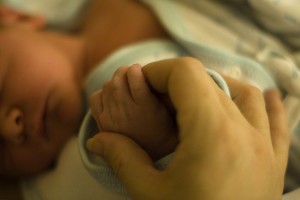Pregnancy, Postpartum Depression, and Sex: A Christian Counselor’s View
Barney Armstrong
 Pregnancy is the most intimate natural communion a human can encounter. Postpartum depression affects about a third of women after the abrupt ending of this closest of all unions. For most of the nine months this 24/7 union has been creating a new norm, a continuity and expectation that is suddenly over.
Pregnancy is the most intimate natural communion a human can encounter. Postpartum depression affects about a third of women after the abrupt ending of this closest of all unions. For most of the nine months this 24/7 union has been creating a new norm, a continuity and expectation that is suddenly over.
The pain of childbirth first referenced in Genesis 3 is more than labor pains. Separation, a loss of communion—that is a pain of childbirth that is not just muscular contractions. In fact, we see it at numerous junctures in a child’s life—mom is in tears leaving her child at day care, the first day getting on the school bus, going away to college, moving out, and of course, when the child “leaves” in a marriage ceremony.
All of these pains are part and parcel of the Genesis Fall. Marriage is just one of the many casualties of The Fall—the fracture lines can be seen in Genesis 3:16-19. The woman looks to her children for what is not fully realized in the marital union. She can become emotionally dependent on her child, especially if she does not receive emotional support from her husband. Postpartum pain and depression should drive a couple to seek God’s intended redemptive trajectory in the centrality of marital intimacy.
During Pregnancy
The emerging new mom can begin this emotional dependence during pregnancy. The closeness of the communion with this new life can be something she clings to for herself almost in a reclusive way. The preventative tactic during pregnancy is to recognize this new life as emanating from her husband and her love relationship with him. So, she might wish to squelch this postpartum potential by focusing not on “my baby,” but on “the fruit of our love relationship” or “our baby.”
After Birth
 An antidote for that loss after birth is the reunion with her husband. The physical union has been interrupted by the pregnancy. Sex can be seen by the pregnant mother as an “invasion” of that union she is hovering over. As the pregnancy continues it can inculcate a protection from the husband rather than a protection given by the husband.
An antidote for that loss after birth is the reunion with her husband. The physical union has been interrupted by the pregnancy. Sex can be seen by the pregnant mother as an “invasion” of that union she is hovering over. As the pregnancy continues it can inculcate a protection from the husband rather than a protection given by the husband.
Charisse noticed that her sexual libido didn’t automatically return after pregnancy. She thought of it as a continuation of a new low level of libido begun in pregnancy. In discussing this with her, she indicated that she began nursing after birth and was currently continuing to nurse her infant. She was unaware that the nursing mother releases progesterone similar to that released in post orgasm. She was not feeling naturally sexually aroused because she was experiencing the hormones that speak to her body of post-orgasmic satisfaction. It was helpful for Charisse to identify what was not a permanent decreased interest in sex.
These effects can produce an expectation of a continuing new norm. Recognizing that it is a season (that it ends and is, in fact, not a new norm) is important in expecting a renewed engagement sexually.
And Beyond
So many mothers of young children spend their day having their bodies “used” by their children. Their day is loaded with touch, and besides the hugging, holding, sitting on the lap and clinging, there is a certain destructive motive, an incentive to punch, pull, pinch and otherwise damage the mom’s body. It is normal for a mom at the end of a day to feel her body has been used and physical activity with her husband only seems like more of the same. Recognizing her husband as he-who-cares-for-and-nurtures-her through her body, she can recentralize their relationship after a hard day.
Lastly, a woman can idealize motherhood to the point of taking on the mystique called “the Madonna Effect.” The notion of being a noble, sacrificial, almost holy figure during the day is not consistent with being a sexy marriage partner later that night. She needs to realize “I am both.” And she can wear both hats separately—she is neither a sexy Madonna with her children nor a Madonna-like sexual partner with her husband.
Christian Counseling Can Be Helpful Here
Talking openly about the relational and physical impacts on your marriage that pregnancy and birth can bring can be helpful in untangling them, understanding them, and making your marriage even more central than before. Christian counseling can help in clarifying these very personal and relational dynamics.
Photos
Courtesy of Flickr CreativeCommon: “Baby Bump Photo” cropped, courtesy of David Veksler, (CC BY-SA 2.0); “Holding Hands with a Newborn Baby,” courtesy of Bridget Coila, (CC BY-SA 2.0)




